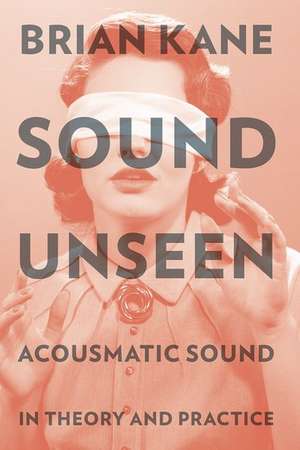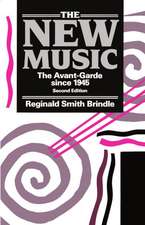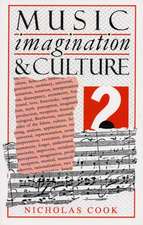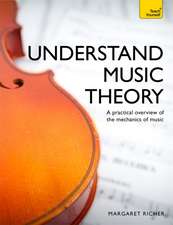Sound Unseen: Acousmatic Sound in Theory and Practice
Autor Brian Kaneen Limba Engleză Paperback – 6 oct 2016
Preț: 254.58 lei
Preț vechi: 315.43 lei
-19% Nou
Puncte Express: 382
Preț estimativ în valută:
48.73€ • 51.19$ • 40.95£
48.73€ • 51.19$ • 40.95£
Carte tipărită la comandă
Livrare economică 01-07 martie
Livrare express 04-08 februarie pentru 94.37 lei
Preluare comenzi: 021 569.72.76
Specificații
ISBN-13: 9780190632212
ISBN-10: 0190632216
Pagini: 336
Dimensiuni: 231 x 155 x 20 mm
Greutate: 0.48 kg
Editura: Oxford University Press
Colecția OUP USA
Locul publicării:New York, United States
ISBN-10: 0190632216
Pagini: 336
Dimensiuni: 231 x 155 x 20 mm
Greutate: 0.48 kg
Editura: Oxford University Press
Colecția OUP USA
Locul publicării:New York, United States
Recenzii
Much in this substantive book will resonate with the reader after the concluding page is turned. Recommended.
The driving force behind Sound Unseen is Kane's argument for a historical, subject-centered theory of acousmatic sound-one that doesn't privilege a particular musical aesthetic, one that doesn't essentialize technologies, and one that admits a consideration of sounds emanating from the interiority of the subjective consciousness...Kane's traversal of the transdisciplinary landscape is graceful and his approach offers a healthy perspective for the field of music research more generally.
Kane uncovers a history of acousmatic sound independent of the legacy of Schaeffer and Pythagoras in order to articulate a rather distinct approach to the study of sound that transcends the divisions between musicology and sound studies...[Sound Unseen] is an essential text for scholars of the philosophy of music, electronic music, sound studies, and phenomenology.
Kane's methodology is multi-disciplinary, analysing a variety of cases.
Brian Kane...has in Sound Unseen written the definitive explanatory tract on the acousmatic.
Sound Unseen is both successful and provocative precisely because of these constructive dissonances. It is a rare book that can put thinkers as diverse as P. F. Strawson or Bertrand Russell on the same page with Derrida or Heidegger, especially with Kane's unassuming clarity. Furthermore, Kane shows how music studies and philosophy can speak to each other when they are conceived as mutually supplemental
Sound Unseen represents a significant contribution to the field of voice studies...Brian Kane succeeds in developing a cogent and flexible explanatory paradigm for acousmatic sound that is clear without being reductive. Kane's account of acousmatic sound allows one to situate the practices of listening within their historical and cultural contexts...Scrupulously researched and conceptually virtuosic, Sound Unseen asks us to rethink the way we listen.
Kane effectively decenters the privileged position of Schaefferian accounts in present discourse and opens the door to a broader survey of acousmatic listening practices spanning a variety of sociohistorical situations...Without doubt, Kane's book makes a significant contribution to existing literature on acousmatic sound, and it is necessary reading for anyone interested in exploring the fertile intersection of music, sound, and philosophy.
The driving force behind Sound Unseen is Kane's argument for a historical, subject-centered theory of acousmatic sound-one that doesn't privilege a particular musical aesthetic, one that doesn't essentialize technologies, and one that admits a consideration of sounds emanating from the interiority of the subjective consciousness...Kane's traversal of the transdisciplinary landscape is graceful and his approach offers a healthy perspective for the field of music research more generally.
Kane uncovers a history of acousmatic sound independent of the legacy of Schaeffer and Pythagoras in order to articulate a rather distinct approach to the study of sound that transcends the divisions between musicology and sound studies...[Sound Unseen] is an essential text for scholars of the philosophy of music, electronic music, sound studies, and phenomenology.
Kane's methodology is multi-disciplinary, analysing a variety of cases.
Brian Kane...has in Sound Unseen written the definitive explanatory tract on the acousmatic.
Sound Unseen is both successful and provocative precisely because of these constructive dissonances. It is a rare book that can put thinkers as diverse as P. F. Strawson or Bertrand Russell on the same page with Derrida or Heidegger, especially with Kane's unassuming clarity. Furthermore, Kane shows how music studies and philosophy can speak to each other when they are conceived as mutually supplemental
Sound Unseen represents a significant contribution to the field of voice studies...Brian Kane succeeds in developing a cogent and flexible explanatory paradigm for acousmatic sound that is clear without being reductive. Kane's account of acousmatic sound allows one to situate the practices of listening within their historical and cultural contexts...Scrupulously researched and conceptually virtuosic, Sound Unseen asks us to rethink the way we listen.
Kane effectively decenters the privileged position of Schaefferian accounts in present discourse and opens the door to a broader survey of acousmatic listening practices spanning a variety of sociohistorical situations...Without doubt, Kane's book makes a significant contribution to existing literature on acousmatic sound, and it is necessary reading for anyone interested in exploring the fertile intersection of music, sound, and philosophy.
Notă biografică
Brian Kane is Associate Professor of Music at Yale University and a founding editor of the journal nonsite.org. His research specializes in contemporary music, sound art, sound studies/auditory culture, histories of listening, and intersections between music and philosophy











![Write Songs from Scratch [With CD (Audio)]](https://i1.books-express.ro/bt/9780851623511/write-songs-from-scratch-with-cd-audio.jpg)

